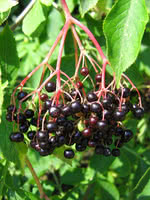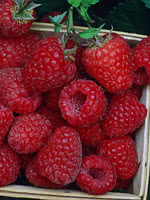Mon-Fri 9am - 5pm Mountain time
Black Elderberry vs Encore Raspberry
Sambucus canadensis
Rubus x Encore
NOT AVAILABLE THIS SEASON - MIGHT RETURN
NOT AVAILABLE THIS SEASON - MIGHT RETURN
Black Elderberry is a deciduous shrub native to eastern North America. You can plant this shrub in moist areas and it will help stabilize your soil. You can also use it on rural properties anywhere you'd use a lilac.
Black Elderberries are considered to be partially self-pollinating. So while they will still produce some berries without cross-pollination, planting with another variety will increase yields. Consider planting with Ranch Elderberry or Bob Gordon Elderberry.
Warning: the seeds, stems, leaves, roots, and uncooked berries of the Black Elderberry are poisonous to humans when eaten in quantity. You should cook the berries to make them safe for human consumption.
Encore Raspberry ripens late season and features nearly spineless branches for easier picking. Its smaller, red berries are sweet and perfect for homemade jams, preserves, or eating straight off the plant.
Encore Raspberry is a floricane raspberry variety, meaning it only produces berries on second-year canes. Cut back dead two-year-old canes as needed, leaving last year's growth.
Black Elderberry Quick Facts
Encore Raspberry Quick Facts
Toxicity: leaves, stems, and uncooked berries are poisonous to humans

